

Over 100 migrants land on Greece's Crete island. Greece and Its Lenders Are at Odds. Greece and its international lenders are inching towards an accord over a set of extra measures demanded from Athens to qualify for vital rescue funds, sources with knowledge of the negotiations said on Tuesday.

The two sides wrapped up the bulk of reforms needed for badly needed bailout cash last week, but left some loose ends which must be tied up before Athens gets 10.3 billion euros ($11.48 billion) of sub-tranches by September. To qualify for the funds, Greek lawmakers grudgingly approved tax hikes and pension reforms, freed up the sale of bad loans weighing on banks’ balance sheets and promised to expedite privatisations.
Migrant crisis: Greek judges tell Syrian refugee Turkey is unsafe. Image copyright EPA Greek judges have ruled that a Syrian asylum seeker should not be sent back to Turkey because it is not safe.
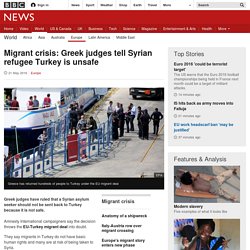
Amnesty International campaigners say the decision throws the EU-Turkey migrant deal into doubt. Official: Greek Efforts to Handle Refugee Crisis Significant. Greece has faced major problems in dealing with the refugee crisis but has made a significant effort to handle the issues, a leading European human rights official said Wednesday.
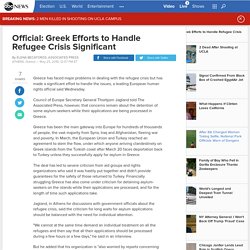
Council of Europe Secretary General Thorbjorn Jagland told The Associated Press, however, that concerns remain about the detention of some asylum-seekers while their applications are being processed in Greece. Greece has been the main gateway into Europe for hundreds of thousands of people, the vast majority from Syria, Iraq and Afghanistan, fleeing war and poverty.
In March, the European Union and Turkey reached an agreement to stem the flow, under which anyone arriving clandestinely on Greek islands from the Turkish coast after March 20 faces deportation back to Turkey unless they successfully apply for asylum in Greece. The deal has led to severe criticism from aid groups and rights organizations who said it was hastily put together and didn't provide guarantees for the safety of those returned to Turkey. Giving for Unaccompanied Refugee Children in Greece. 26 3Google +0 0 0 29 By Sofia Kouvelakis / Program Officer at Bodossaki Foundation Ali is eight years old.
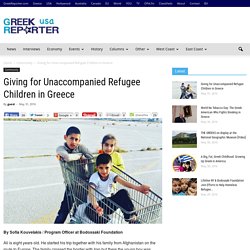
Greek economy shrinks 0.5 percent in first quarter, contraction revised up. Greece's economy contracted in the first quarter at a slightly faster pace than previously estimated, provisional estimates by the Greek statistics service ELSTAT showed on Monday, weighed by weaker consumer spending and net exports.
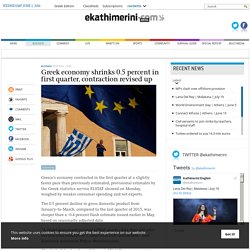
The 0.5 percent decline in gross domestic product from January-to-March, compared to the last quarter of 2015, was steeper than a -0.4 percent flash estimate issued earlier in May, based on seasonally adjusted data. "A slight downward revision of first quarter data does not alter our full-year forecast for a small real GDP contraction," said Eurobank economist Platon Monokroussos. Monday's data also showed Greece's 176 billion euro economy shrank by 1.4 percent on an annual basis in the first quarter, at a faster clip than a previous -1.3 percent estimate.
The EU Commission projects Greece's economy will contract by 0.3 percent this year and rebound by 2.7 percent in 2017. Last year it shrank by 0.2 percent. Jagland: 'We have put a heavy burden on Greece' Thorbjorn Jagland, the secretary-general of the Council of Europe.
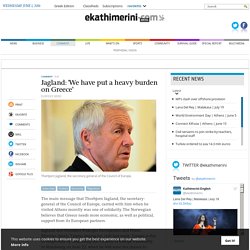
The main message that Thorbjorn Jagland, the secretary-general of the Council of Europe, carried with him when he visited Athens recently was one of solidarity. The Norwegian believes that Greece needs more economic, as well as political, support from its European partners. Jagland met President Prokopis Pavlopoulos and Prime Minister Alexis Tsipras during his visit last week. Migrant crisis: 'Document forgers' held in Greece and Czech Republic. Image copyright AFP Police in Greece and the Czech Republic have arrested more than 20 people suspected of forging travel documents for migrants trying to enter Europe.
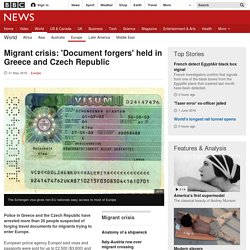
European police agency Europol said visas and passports were sold for up to £2,500 ($3,600) and sent across the EU, Africa, the Middle East and Asia. Greek police said the criminal networks were also involved in smuggling people across borders. About 100 people are still wanted in Greece and other countries. Europol said the network was based in Athens and consisted of two criminal groups, one run by Sudanese people and another by Bangladeshis, and 16 people have been arrested in Greece. Image copyright EPA Both groups forged passports, national ID cards, Schengen visas, driving licences, asylum seekers' registration cards and residence permits, police said. European money doesn't want to go to Greece. Greece and its creditors may have averted a crisis by agreeing on the release of another dose of bailout money, but the deal does little to address a deeper problem: Europeans still don't want to put their money there.
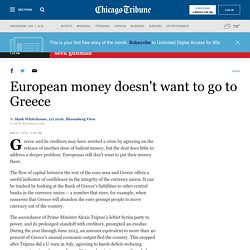
The flow of capital between the rest of the euro area and Greece offers a useful indicator of confidence in the integrity of the currency union. Migrant crisis: Greece starts deportations to Turkey. The first boats carrying migrants being deported from Greece have arrived in Turkey as part of an EU plan aimed at easing mass migration to Europe.
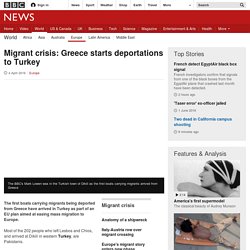
Most of the 202 people who left Lesbos and Chios, and arrived at Dikili in western Turkey, are Pakistanis. Under the deal, for each Syrian migrant returned to Turkey, the EU is due to take in another Syrian who has made a legitimate request. Thirty-two Syrian migrants were the first to arrive in Germany from Turkey. Greece’s Debt Crisis Explained. The Soup Kitchens of Athens. Photo ATHENS — After last summer, when the clash between ’s Syriza government and the insolvent state’s creditors ended, the world’s media moved on.

Greece’s rebellion against the austerity measures imposed on it was snuffed out in July 2015 when Prime Minister Alexis Tsipras folded. Greece’s disappearance from the financial headlines since then has been seen as a sign that its economy has stabilized. Sadly, it has not. Lest we forget, Greece had by 2015 already endured years of austerity. In comparative terms, by the proportion of national income diverted to reducing budget deficits, Greece had absorbed austerity measures almost nine times the magnitude of those imposed in Italy and about three times Portugal’s.
Against this background, Greek voters elected my then party, Syriza, in January 2015 to negotiate an end to self-defeating austerity in exchange for serious reforms.